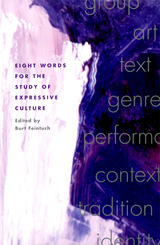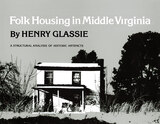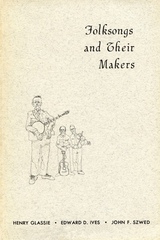3 books about Glassie, Henry

Eight Words for the Study of Expressive Culture
Edited by Burt Feintuch
University of Illinois Press, 2003
Group. Art. Text. Genre. Performance. Context. Tradition. Identity.
No matter where we are--in academic institutions, in cultural agencies, at home, or in a casual conversation--these are words we use when we talk about creative expression in its cultural contexts. Eight Words for the Study of Expressive Culture is a thoughtful, interdisciplinary examination of the keywords that are integral to the formulation of ideas about the diversity of human creativity, presented as a set of essays by leading folklorists.
Many of us use these eight words every day. We think with them. We teach with them. Much of contemporary scholarship rests on their meanings and implications. They form a significant part of a set of conversations extending through centuries of thought about creativity, meaning, beauty, local knowledge, values, and community. Their natural habitats range across scholarly disciplines from anthropology and folklore to literary and cultural studies and provide the framework for other fields of practice and performance as well.
Eight Words for the Study of Expressive Culture is a much-needed study of keywords that are frequently used but not easily explained. Anchored by Burt Feintuch’s cogent introduction, the book features essays by Dorothy Noyes, Gerald L. Pocius, Jeff Todd Titon, Trudier Harris, Deborah A. Kapchan, Mary Hufford, Henry Glassie, and Roger D. Abrahams.
No matter where we are--in academic institutions, in cultural agencies, at home, or in a casual conversation--these are words we use when we talk about creative expression in its cultural contexts. Eight Words for the Study of Expressive Culture is a thoughtful, interdisciplinary examination of the keywords that are integral to the formulation of ideas about the diversity of human creativity, presented as a set of essays by leading folklorists.
Many of us use these eight words every day. We think with them. We teach with them. Much of contemporary scholarship rests on their meanings and implications. They form a significant part of a set of conversations extending through centuries of thought about creativity, meaning, beauty, local knowledge, values, and community. Their natural habitats range across scholarly disciplines from anthropology and folklore to literary and cultural studies and provide the framework for other fields of practice and performance as well.
Eight Words for the Study of Expressive Culture is a much-needed study of keywords that are frequently used but not easily explained. Anchored by Burt Feintuch’s cogent introduction, the book features essays by Dorothy Noyes, Gerald L. Pocius, Jeff Todd Titon, Trudier Harris, Deborah A. Kapchan, Mary Hufford, Henry Glassie, and Roger D. Abrahams.
[more]

Folk Housing in Middle Virginia
A Structural Analysis of Historic Artifacts
Henry Glassie
University of Tennessee Press, 1976
In this fascinating analysis of eighteenth-century vernacular houses of Middle Virginia, Henry Glassie presents a revolutionary and carefully constructed methodology for looking at houses and interpreting from them the people who built and used them. Glassie believes that all relevant historical evidence – unwritten as well as written – must be taken into account before historical truth can be found. He in convinced that any study of man’s past must make use of nonverbal and verbal evidence, since written history – the story of man as recorded by the intellectual elite – does not tell us much about the everyday life, thoughts, and fears of the ordinary people of the past. Such people have always been in the majority, however, and a way has to be found to include them in any valid history. In Folk Housing in Middle Virginia Glassie admirably sets forth such a way.
The people who lived in Middle Virginia in the eighteenth century are almost unknown to history because so little has been written about them. After Glassie selected the area – roughly Goochland and Louisa counties – for study, he selected a representative part of the countryside, recorded all the older houses there, developed a transformational grammar of traditional house designs, and examined the area’s architectural stability and change.
Comparing the houses with written accounts of the period, he found that the houses became more formal and lee related to their environment at the same time as the areas established political, economic, and religious institutions were disintegrating. It is as though the builders of the houses were deliberately trying to impose order on the surrounding chaotic world. Previous orthodox historical interpretations of the period have failed to note this. Glassie has provided new insights into the intellectual and social currents of the period, and at that time has rescued a heretofore little-known people from historiographical oblivion. Combining a fresh, perceptive approach with a broad interdisciplinary body of knowledge, ha has made an invaluable breakthrough in showing the way to understand the people of history who have left their material things as their only legacy.
The people who lived in Middle Virginia in the eighteenth century are almost unknown to history because so little has been written about them. After Glassie selected the area – roughly Goochland and Louisa counties – for study, he selected a representative part of the countryside, recorded all the older houses there, developed a transformational grammar of traditional house designs, and examined the area’s architectural stability and change.
Comparing the houses with written accounts of the period, he found that the houses became more formal and lee related to their environment at the same time as the areas established political, economic, and religious institutions were disintegrating. It is as though the builders of the houses were deliberately trying to impose order on the surrounding chaotic world. Previous orthodox historical interpretations of the period have failed to note this. Glassie has provided new insights into the intellectual and social currents of the period, and at that time has rescued a heretofore little-known people from historiographical oblivion. Combining a fresh, perceptive approach with a broad interdisciplinary body of knowledge, ha has made an invaluable breakthrough in showing the way to understand the people of history who have left their material things as their only legacy.
[more]

Folksongs and Their Makers
Henry Glassie, Edward D. Ives, and John F. Szwed
University of Wisconsin Press, 1979
Three prominent folklorists wrote these essays in the 1970s about Dorrance Weir of upstate New York and his song "Take that Night Train to Selma," Joe Scott of Maine and his song "The Plain Golden Band," and Paul Hall of Newfoundland and "The Bachelor's Song."
[more]
READERS
Browse our collection.
PUBLISHERS
See BiblioVault's publisher services.
STUDENT SERVICES
Files for college accessibility offices.
UChicago Accessibility Resources
home | accessibility | search | about | contact us
BiblioVault ® 2001 - 2024
The University of Chicago Press









